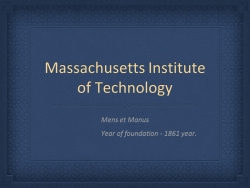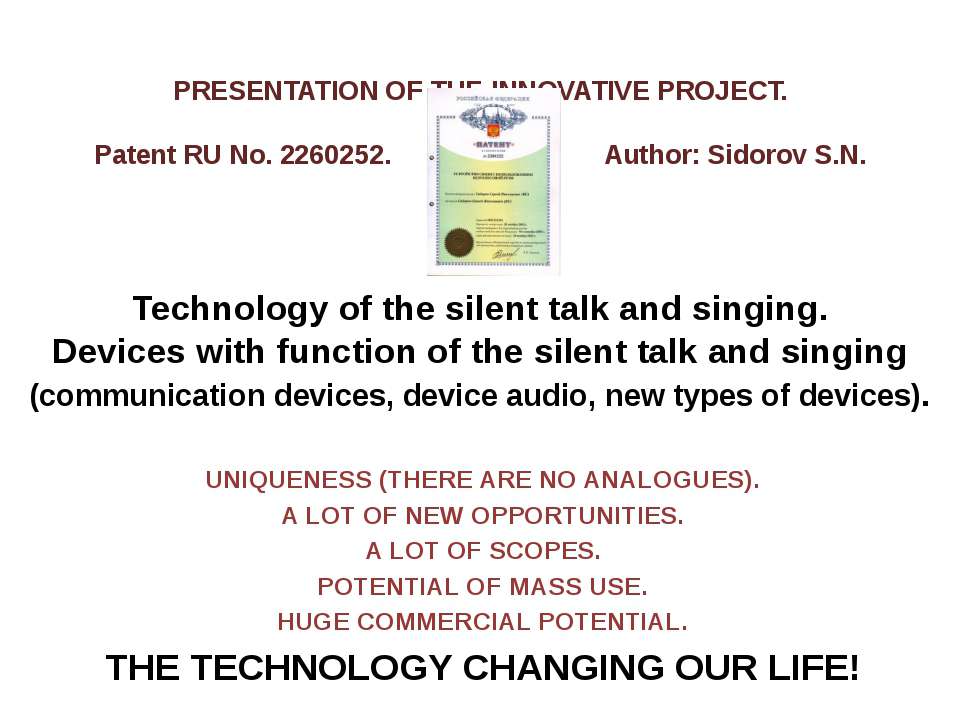Презентация по теме "Massachusetts Institute of Technology (MIT)"

- Рубрика: Презентации / Другие презентации
- Просмотров: 99
Презентация для классов "Презентация по теме "Massachusetts Institute of Technology (MIT)"" онлайн бесплатно на сайте электронных школьных презентаций uchebniki.org.ua
MIT located in Cambridge (a suburb of Boston), Massachusetts, USA. Also known as the Massachusetts Institute of Technology and the Massachusetts Institute of Technology. One of the most prestigious technical educational institutions in the USA and the world.
MIT holds leading positions in prestigious rankings of world universities, is an innovator in the fields of robotics and artificial intelligence
In 1861, the Commonwealth of Massachusetts approved the charter of William Burton Rogers to establish the "Massachusetts Institute of Technology and the Boston Society of Natural Sciences." William Burton Rogers wanted to create a new form of higher education that would meet the challenges of rapidly developing science in the middle of the XIX century, to which classical education could no longer give an adequate answer. After the adoption of the charter, Rogers began to look for funds, develop the curriculum and select a suitable place for the institute. The Rogers Plan, as it is now known, was based on three principles: the educational value of useful knowledge, the need for learning through action, and the unification of professional and humanitarian sciences. His philosophy is "learning is not about manipulations and the most important details of science, which can only be applied in practice, but in the knowledge and understanding of all the basic scientific principles with their explanations." Due to the civil war that began a few months later, the first classes at MIT were held only in 1865 in a rented room of a trading house in the suburbs of Boston.
The construction of the first MIT building in the Back Bay area was completed in 1866 and was known as "Boston Techno" until the campus sprouted across the Charles River to Cambridge in 1916. Over the years, scientific and engineering training began to move away from Rogers' ideal and focused more on practical than theoretical subjects. Moreover, the Institute faced financial problems and problems of recruiting faculty. MIT was so specialized that it was detrimental to the rest of the training. The "School up the River" (Harvard University) sought a merger from the MIT administration; the original plan was canceled in 1900 due to protests from graduates of the institute. In 1914, the merger of MIT and the Harvard Department of Applied Science was officially announced, and it was to begin "when the institute occupies its new luxurious buildings in Cambridge." However, in 1917, the merger with Harvard was canceled due to a state court decision.
At the University of Massachusetts , 5 faculties are Schools:
- natural and exact sciences;
- urban planning and architecture;
- management;
-engineering sciences;
- social and humanitarian sciences and arts.
Each School has its own departments (departments).
The most numerous is the Faculty of Engineering, where about 70% of bachelors, as well as 45% of doctoral and postgraduate students study. Following him in popularity are the faculties of exact and natural sciences, as well as management.In 2019, there was an expansion of the Massachusetts Institute of Technology - the faculty, which currently does not accept students, is planning programs to study artificial intelligence. The Schwartzman College of Information Technology is endowed with a special status and is a completely new unit that interacts with five other Schools.
MIT Media Lab is an interdisciplinary research laboratory of the Massachusetts Institute of Technology, which grew out of the Architectural Machines group of the MIT School of Architecture. The scope of the laboratory's interests covers technology, medicine, science, art and design. In 2014, research groups included neuroscience, biologically inspired engineering, social robotics, emotional computing, bionics, and hyper-tools. The budget for the end of 2016 was $65 million.The Media Lab was founded in 1985 by Nicholas Negroponte and former MIT President Jerome Wiesner in the "Wiesner Building" (project — Yu Ming Pei), also known as the "E15 Building". In 2009, the laboratory expanded, occupying the second building.
When Massachusetts Institute of Technology commissioned Steven Holl in 1999 to design a new a dormitory for the school they had one goal in sight: that the spaces around and within the building would stir up interaction among students. While MIT focused on the building’s use and function, Holl aimed to create a memorable building. With MIT’s vision in mind along with Holl’s artistic architectural ideas, the ten-story undergraduate dormitory became a small city in itself with balancing opposing architectural elements, such as solids and voids and opaqueness and transparency.
More on Simmons Hall after the break.
Holl’s design solution was that the building would metaphorically work as a sponge. It would be a porous structure that would soak up light through a series of large openings that would cut into the building so that light would filter through in section. These breaks in section would then become main interactive spaces for the students, providing views onto different levels. In his original drawings, Holl referred to these breaks as the building’s “lungs” as they would bring natural light down while circulating air up.
Unfortunately, the final design was not able to incorporate these gaps at the massive scale that Holl originally had in mind due to fire regulations. Nonetheless the main concept was still carried through with smaller breaks. The lungs scattered throughout the building have a dynamic organic geometry that juxtaposes the rigidity of the gridded rectilinear exterior. Along this colored exterior grid system are five large openings, or voids, in an otherwise solid structure that correspond to main entrances, view corridors, and outdoor terraces.
The building of the Massachusetts Institute of Technology / Massachusetts Institute of Technology Kresge Auditorium was built by the Finnish architect Eero Saarin / Eero Saarine. It was an experiment of architectural forms and structures to match the technological institute specializing in innovation. The Feat of Engineering, Engineering and Architectural Design serves as a meeting place and is part of the cultural, social and spiritual core of the MIT campus. The Kresge Auditorium building is one of Saarinen's many bold, egalitarian* designs that reflected the mood of post-war America with the rapid growth of the economy and the social standard of living of the population.
















